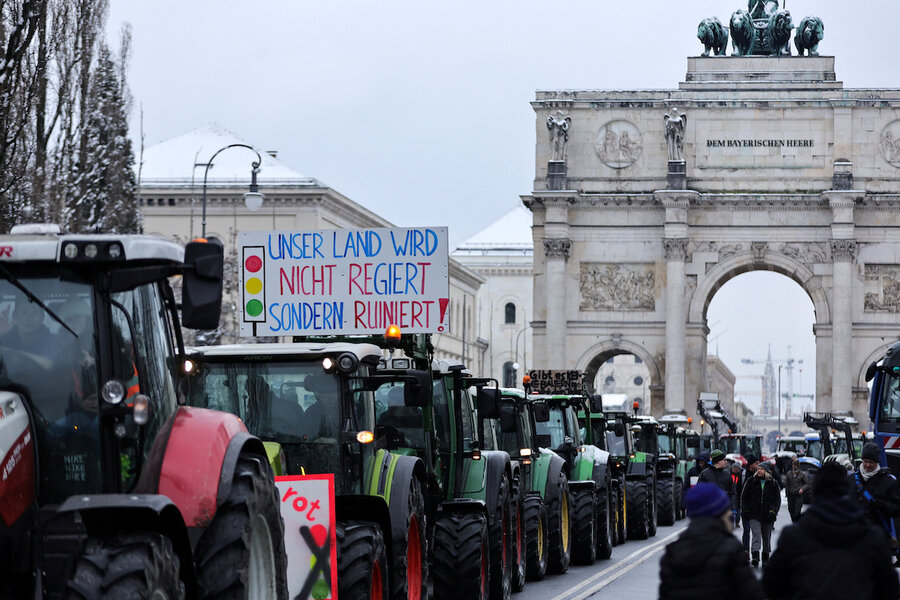German farmers tell government to hit the brakes on subsidy cuts
Loading...
| Berlin
German farmers kicked off a week of nationwide protests against subsidy cuts on Jan. 8, blocking roads with tractors and piling misery on Chancellor Olaf Scholz’s coalition as it struggles to fix a budget mess and contain rising far-right forces.
Convoys of tractors and trucks gathered on roads in sub-zero temperatures in nearly all 16 federal states, while protesters clashed with police and leading politicians warned that the unrest could be co-opted by extremists.
In some areas, farmers used tractors to block entry roads to highways, including several border crossings with France, causing traffic jams. There was disruption due to convoys of tractors in and around some cities, too. Production at a Volkswagen auto plant in Emden in northwestern Germany was stopped because access roads were blocked, preventing employees from getting to work, the German news agency dpa reported.
The protests have forced Mr. Scholz’s unpopular government into a tricky balancing act, trying to keep a lid on the unrest while sticking to fiscal discipline after a constitutional court ruling in November threw its spending plans into disarray.
“Our farmers come first, ”read one poster from the far-right Alternative for Germany party.
Vice Chancellor Robert Habeck, whose return from vacation last week was disrupted by furious farmers trying to storm the ferry he was on, warned in a video message Jan. 8 that farmers’ right to protest could be exploited by fringe groups.
“Calls are circulating with coup fantasies, extremist groups are forming and ethnic-nationalist symbols are being openly displayed,” Mr. Habeck said.
Farmers called the protests in response to the government’s decision to phase out a tax break on agricultural diesel as it tries to bring its 2024 budget over the finish line while complying with the constitutional court ruling. They say losing the refund, as well as a partial exemption on agricultural vehicles – currently saving them about 900 million euros ($980 million) per year – will unfairly burden them and drive them out of business.
“For a farm like mine, I would lose about 10,000 euros,” said a farmer from Bavaria, Ralf Huber. “For our businesses, it’s a catastrophe.”
The far-right AfD party, hoping for major gains in a string of state elections this year, backs the protest, using it as proof of Germans’ dissatisfaction with current leadership.
Hermann Blinkert at the German Institute for New Social Answers said the government was in a bind because it looks bad if it backtracks completely on cutting farm subsidies, but also if the dispute continues.
Earlier backlash from farmers prompted Mr. Scholz’s coalition last week to make unexpected changes to the budget. But farmers say this doesn’t go far enough.
“The government has the problem that it has already gambled away the trust of the population,” Mr. Blinkert said. “Only one in three voters would currently elect one of the three governing parties.”
The protests add to the challenges facing a tense coalition that has seen the climate-friendly Greens fighting for different budget priorities than the pro-business FDP and center-left Social Democrats as the country struggles with a recession.
The AfD is currently polling at 23%, according to the weekly INSA poll, comfortably ahead of Mr. Scholz’s SPD and his two coalition partners, the Greens and the Free Democrats.
Protests spur warnings
Ministers and a domestic intelligence chief have warned that the right-wing extremists could try to exploit the protests.
According to the German media outlet Der Spiegel, members of several right-wing extremist groups, including The Homeland and Third Way, were at a rally in Berlin, as were AfD members. In Dresden, a video on social media showed people carrying flags from the Free Saxony right-wing extremist party clashing with police.
Stephan Kramer, head of the domestic intelligence agency in Thuringia – one of three eastern states where the AfD looks likely to make gains in elections this year – said right-wing extremists’ strategy was to hijack protests.
In the past, they have “constantly and consistently tried to infiltrate every form of legitimate civil protest,” Mr. Kramer told business daily Handelsblatt, pointing to the 2015 migrant influx and the COVID-19 pandemic as examples.
On top of potential disruption caused by the farmers’ protests, travelers in Germany are also facing a nearly three-day strike by a union representing many of the country’s train drivers, which is stepping up its action against state-owned railway operator Deutsche Bahn in an unrelated dispute over working hours and pay, according to The Associated Press.
This story was reported by Reuters, with material from The Associated Press.







